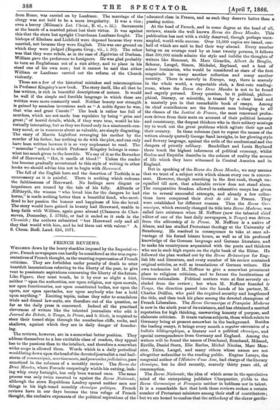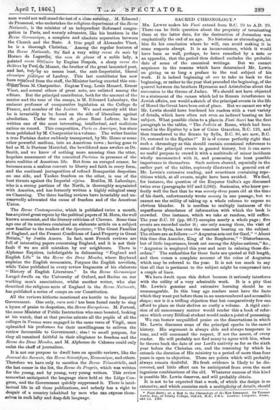FRENCH REVIEWS.
WEIGHED down by the heavy shackles imposed by the Imperial re- gime, French newspapers can hardly be considered as the true repre- sentatives of French thought, as the unerring repercussion of French criticism. They are forbidden under penalty of death to utter heartfelt lamentations referring to the liberty of the past, to give vent to passionate aspirations concerning the liberty of the future. Like Figaro, they must touch, be it by ever so slight a hint, neither "upon the authorities, nor upon religion, nor upon morals, nor upon functionaries, nor upon constituted bodies, nor upon the opera, nor upon spectacles, nor upon anybody who has a hold upon anything." Exciting topies, unless they refer to scandalous trials and dismal law-suits, are therefore out of the question, as far as the daily press is concerned. Indeed all the practised cleverness of writers like the talented journalists who edit is Journal des Debate, Is Temps, la Presse, and is Siècle, is required to steer their tossed ships through the numberless cliffs, rocks, and shallows, against which they are in daily danger of founder- ing.
The reviews, however, are in a somewhat better position. They address themselves to a less excitable class of readers, they appeal less to the passions than to the intellect, and therefore a somewhat wider scope is allowed them. Words which in a daily periodical wouldbring down upon the head of the devoted journalist a real hail- storm of communique's, avertissements, andpoursuites judiciaires,pass unnoticed in the columns of a monthly review. The Revue des Deux Mondes, where Forcade unsparingly wields his cutting, lash- ing whip every fortnight, has only been warned once. The same process was only twice resorted to against the Revue Nationale, although the stern Republican Lanfrey spared neither men nor things in his high-toned monthly chronique politique. French reviews have in our days become the true refuge of French thought, the exclusive exponents of the political aspirations of the educated class in France, and as such they deserve better than a passing notice.
At the head of French, and in some degree at the head of all, reviews, stands the well known Revue des Deux Mondes. This publication has met with a richly deserved, though perhaps unex- ampled, world-wide success. Over 15,000 copies are issued, one- half of which are said to find their way abroad. Every number being on an average read by at least twenty persons, it follows that 300,000 minds admire the style and imbibe the thoughts of writers like Remusat, St. Marc Girardin, Albert de Broglie, Scherer, Laugel, Simon, Michelet, Reybaud, and a host of minor luminaries, who would be considered as stars of the first. magnitude in many another collection and many another country. There is scarcely in Europe, nay, there is scarcely in the whole world, a respectable club, a first-rate reading- room, where the Revue des Deux Mondes is not to be found and eagerly perused. Every question, be it political, philoso- phical, literary, or scientific, is treated by a clear head and. a masterly pen in that remarkable book of essays. Among its chief contributors are the foremost men belonging to all the classes of the Institut de France, the most renowned profes- sors driven from their seats on account of their political honesty and consistency, the deepest thinkers who in their solitary musings try to work out the great problems which agitate their age and their country. In these columns (not to repeat the names of the writers already quoted) George Sand inveighs, in her glowing style and flowery language, against the evils of the confessional and the dangers of priestly celibacy. Baudrillart and Louis Reybaud there teach the highest inferences of political economy, whilst Reclus and Esquifos describe in the colours of reality the scenes of life which they have witnessed in Central America and in England.
But in speaking of the Revue des Deux Mondes, we may assume that we treat of a subject with which almost every one is conver- sant. However, though marching in the first rank, though un- equalled till now, that admirable review does not stand alone. The comparative freedom allowed to exhaustive essays has given_ rise to several successful attempts, and already a few collec- tions have conquered their droit de cite in France. They were established for different reasons. Thus the Revue Ger- manique, which recently changed its title into Revue Moderns, was called into existence when M. Nefftzer (now the talented chief editor of one of the best daily newspapers, is Temps) was driven from the editorship of la Presse. M. Nefftzer is a native of Alsace, and has studied Protestant theology at the University of Strasbourg. He resolved in consequence to take at once ad- vantage of his forced leisure hours, as well as of his profound knowledge of the German language and German literature, and to make his countrymen acquainted with the poets and thinkers who are in such high repute on the right bank of the Rhine. He followed the plan worked out by the Revue Britannique for Eng- lish life and literature, and every number of his review contained original articles, as well as translations of German writers. His own tendencies led M. Neff tzer to give a somewhat prominent place to religious criticism, and to favour the lucubrations of German rationalists. Political matters were at first severely ex- cluded from the review ; but when M. Nefftzer founded le Temps, the direction passed into the hands of his partner, M. Charles Dollfus, who paid the required security and lengthened the title, and then took his place among the devoted champions of French Liberalism. The Revue Germanique et Frangaise Moderns is now in the ninth year of its existence, and has obtained a merited reputation for high thinking, unswerving honesty of purpose, and elaborate criticism. It treats various subjects, those which relate to Germany being at present somewhat in the background. Besides the leading essays, it brings every month a regular succession of a bulletin bibliographique, a literary and a political chronique, and special correspondence from Germany and England. Among the
writers will be found the names of Deschanel, Ronchaud, Milsand, Revile, Daniel Stern, Elie Reclus, Michel Nicolas, Marc Mon- nier, Taine, Laugel, and many others whose names are not altogether unfamiliar to the reading public. Eugene Lataye, the congenial author of PHistoire d'une Arne, had charge of the literary chronique, but he died recently, scarcely thirty years old, of consumption.
The Revue Nationale, the idea of which arose in the speculative mind of the enterprising *publisher Charpentier, yields to the
Revue Germanique et Frangaise neither in boldness nor in talent. It is a remarkable fact that both these reviews reckon a certain number of Protestant ministers among their staff of contributors ; but we are bound to confess that the orthodoxy of the clever gentle-
men would not well stand the test of a claw scrutiny. M. Edmond de Pressense, who undertakes the religious department of the Revue Nationale, is the minister of an independent Reformed congre- gation in Paris, and warmly advocates, like his brethren in the Revue Germanique, a complete and -absolute separation between the Church and the State. A tr& pupil. of Alexandre Vinet, he is a thorough Christianr! Among the regular features of the Revue Nationaleore- find a very witty revue du mole by Horace de Lagarcykr,' the nom de plume of a noble lady, a pointed revue litfexaire by Eugene Despois, a sharp revue des the'd tres by Pa and last, bu chronique been re
e Musset, the brother of the great lamented poet, by no means least, the anti-Imperialist, liberal
olitique of Lanfrey. This last contributor has now
veil from the staff, the Minister having exacted this con- from M. Charpentier. Eugene Yung, Louis Meuard, Ernest Vinet, and several others of great note, are enlisted among the editors. But the principal contributor, both for the amount of the matter and the tone of the essays, is M. Edouard Laboulaye, the eminent professor of comparative legislation at the College de
France, and member of the Institut. We need scarcely add that he is invariably to be found on the side of liberalism against absolutism. Under the nom de plume Rene Lefevre, he has written one of the most interesting, intellectual, and malicious satires on record. This composition, Paris en Amerique, has since
been published by M. Charpentier in a volume. The writer fancies a true Parisian doctor suddenly transported, by Mr. Home or some other powerful medium, into an American town ; having gone to bed as M. le Docteur Marechal, the bewildered man awakes as Dr.
Smith, and we know of nothing more amusing than the utter, hopeless amazement of the conceited Parisian in presence of the
stern realities of American life. But from an enraged censor, he becomes soon a zealous convert to liberty and faith in every form, and the continual juxtaposition of refined Bonapartist despotism on one side, and Yankee freedom on the other, is one of the
best thrusts against the Imperial regime. Besides, M. Laboulaye, who is a strong partizan of the North, is thoroughly acquainted
with America, and has formerly written a highly eulogical essay on Channing. The three leading reviews have invariably and un- reservedly advocated the cause of freedom and of the American Union.
The Revue Contemporaine, which is published twice a month, has acquired great repute by the political papers of M. Horn, the well
known economist, and the literary criticism of Claveau. Some time
ago one of its numbers contained an elaborate article on a subject now familiar to the readers of the Spectator, "The Great Families
of England, and the Present Conditions of Land Property in Great Britain," by Justin Amero. In fact, most French reviews are Lull of interesting papers concerning England, and it is not their fault if we are still mistaken by our neighbours. There is
Alphonse Esquiros, indefatigable in delineating "England and English Life" in the Revue des Deux Mondes, where Reybaud explains the English economists, Forgues the English novelists, while Taine published in every review fragments of his elaborate " History of English Literature." In the Revue Germanique Laugel dwells on the University of Oxford, and Reclus on our working men's associations, whilst another writer, who also described the religious sects of England in the Revue Nationale, has published a series of essays on our Constitution.
All the reviews hitherto mentioned are hostile to the Imperial Government. One only, rara avis ! has been found ready to sing a hymn of praise to despotism, the Revue Europeenne. M. Fortoul,
the same Minister of Public Instruction who once boasted, looking at his watch, that at that precise minute all the pupils of all the colleges in France were engaged in the same verse of Virgil, once upbraided his professors for their unwillingness to enliven the review favourable to Government ; alas! to small purpose, for
they all remained faithful in their allegiance to freedom and the Revue des Deux Mondes, and M. Alphonse de Calonne could only 'enlist the chaff of journalism.
It is not our purpose to dwell here on specific reviews, like the Journal des Savants, the Revue Scientifique, Economique, and others. Therefore we have only to mention the Revue Trimestrielle, and the last comer in the list, the Revue du Progre,s, which was written for the young, and by young, very young writers. This review somewhat anticipated the language since held at the Liege Con- gress, and the Government quickly suppressed it. There is intel- lectual life in all these publications, and nobody has a right to despair of a country inhabited by men who Can etpress them- selves in such lofty and deep-felt language.































 Previous page
Previous page